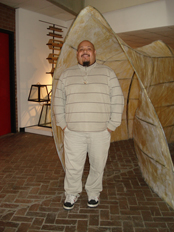

It has been a big adjustment for Jose Casas, a professional playwright, to relocate from the second largest city in the United States to Charleston. "Los Angeles is a huge city full of skyscrapers and Charleston, well, the highest point of Charleston's cityscape is church steeples," said Casas. Nevertheless, Casas feels at home and has found a surprising number of parallels between the East and West Coasts that have already begun to inspire his art.
Jose Casas is a playwright, director, and actor from Baldwin Park, Calif. He was born and raised in Los Angeles where he earned his B.A. in Dramatic Arts from the University of California, Santa Barbara. "The campus is on the beach," Casas said. "Not near the beach but literally on it."
Casas received his M.A. in theatre arts from California State University in L.A. and went on to get a second master's degree in fine arts (M.F.A.) from Arizona State University in creative writing/playwriting.
Jose Casas, who started at the College in Fall 2009, specializes in teaching Playwriting I and II. Casas also teaches Script Analysis, Introduction to Theatre, and specialty topic courses such as Playwriting for Young Audiences.
When Casas is not teaching, you can find him at a Charleston Riverdogs or Charlotte Hornets game or collecting his thoughts out on Folly Beach.
Before taking his teaching position at the College, Casas worked at two different theatres in L.A. that are dedicated to raising awareness of issues in the Latino communities. Casas identifies himself as Chicano, a U.S. citizen of Mexican descent, a term popularized by the Mexican American Civil Rights movement in the 1960s. Much of his work is inspired by political activism and the Mexican American ideology.
His plays include "A Bag of Oranges," "The Assassination of Erik Estrada," and "Freddie's Dead/Mindprobe," which won the Sherill C. Corwin/Metropolitan Theatre Award for Best One-Act Play. Also, his "14" was a winner of the 2003-2004 ARIZONI Award for Best Production-Original Play and received publication in the Ethnotheatre Anthology, and "la ofrenda" ("the offering") was the winner of the 2004-2005 Bonderman Playwriting for Youth National Competition.
Casas' most recent work, "Somebody's Children," is a series of vignettes following the lives of five homeless Orange County children and the harsh realities they struggle to survive in, all the while living in the shadow of "the happiest place on earth," Disneyland. It is this irony that Casas instills in all of his works. "It is a real honest story about kids dealing with adult problems," said Casas, "It's not my style to sugar coat things. I want the youth to know that there is always someone who wants to tell their stories."
This style is reflected in his teaching. "My goal as a professor is to show students that there is a world outside of South Carolina," Casas said. "And in turn I am learning about South Carolina's culture through them."
Casas notes that stereotyping and discrimination are just as present in the South as on the West coast, only it manifests in a different way. "Some of our debates have been extremely lively. And that's good because I think college is really a great chance for students to be allowed to use their voice and their opinions," Casas said. "I tell my students we can have opinions that are diametrically opposed but what I want is for them think critically and stand up for what they believe in."
"Jose Casas has brought a uniqueness to the theatre department that has never been seen before," said theatre professor Glenda Byars. "He inspires his students and colleagues to take a different perspective on a lot of issues."
Casas' goal is to make an impact in the theatre department and really see it grow towards making a difference in the multicultural community. "The College can't just talk about diversity but has to actually facilitate it. I plan on writing plays that address these issues and force us to ask where are we in terms of diversity, to ask it on an individual level and also on an institutional level," Casas said.
###